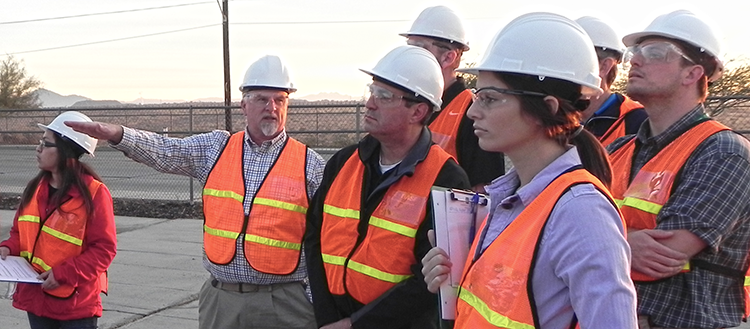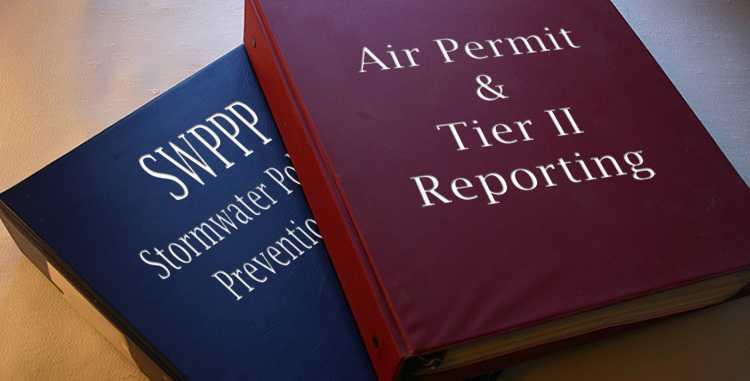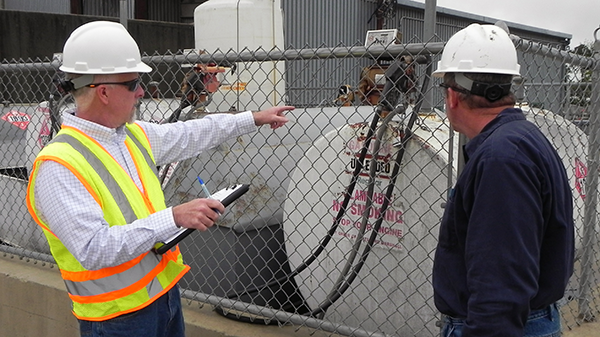Environmental compliance training is required in certain ways for various facilities with different environmental permits.
The knowledge of environmental regulatory issues is one of the largest issues facing businesses and organizations today. Regulations often exist on the city, county, state, and federal level, meaning you'll have to deal with 2, 3, 4, or more agencies to find out what rules, laws, and regulations you need to be following. Trust us, it's a nightmare, and one way to help lessen that never ending drudgery is though environmental compliance training, ensuring your staff knows exactly what they need to.
No one wants to find out the hard way they aren't following the rules. Whether you're caught speeding or fined by the IRS, you're getting in trouble for not following a certain set of laws or rules.
The same thing can, and does, happen to folks with environmental laws, rules, and regulations.
For example, a hot thing these days is for 3rd party environmental groups to figure out a facility doesn't have a permit, isn't conducting something like TRI Reporting, or something similar. All the environmental information about your facility is public knowledge, and a kid using the USEPA's Echo Database can pretty easily figure out whether or not you're doing what you should be doing.
How can a company, big or small, combat this? Simple answer is follow all the rules. Easy, right?
Not necessarily.

Is "environmental compliance" training required?
When we have the chance to help a customer get into environmental compliance, we have to bring up required parts of their permits or plans, such as training, annual reviews, annual certifications, etc.
Virtually every environmental permit, plan, approval, etc. out there requires some sort of annual environmental training.
SPCC plans require regular SPCC training.
NPDES stormwater permits require regular stormwater training.
That doesn't mean (for either the SPCC plan or stormwater permit) once every 10 years. It usually means at least once per year.
The problem is, most folks usually get defensive about the mere concept of training.
"It's too expensive. My guys don't care about this crap. Who's gonna check and see if we're doing this? We already have our permits, what's gonna change?"
Laugh all you want, but this is, unfortunately, a very real mentality we encounter.
You can come up with whatever argument you want, problem is, these things are required. And folks do need to see proof. They might even ask you and your staff about it. Inspectors, regulators, and God forbid you ever get in trouble with a 3rd party environmental group, are going to want some sort of proof of training.
But does training on a stormwater permit or SPCC plan really count as environmental compliance training?
In a sense, yes. But in another sense, no.
Training on your individual permit, plans, and approvals is required. No bones about it. That, in a way, is training on environmental issues to keep you in compliance.
But when we say compliance training, we mean a more holistic, higher level overview of compliance. How these regulations impact your facility, why we're training on them, who they impact besides us, how we fit into the bigger picture, etc. It's more than just here's your permit, you have to do X, Y, and Z, and we'll see you next year.
But, this type of training, what I just mentioned, is not specifically required.
So ask yourself, what are you looking for? Training to stay in compliance with your permits and approvals, or a higher level training? For most it's just compliance. For folks who are looking to take on a more proactive environmental policy or program, it's the higher level stuff.

What's required with environmental compliance training?
Let's discuss some issues and reasons you would be conducting training as related to your permits, plans, or approvals.
Something's Changed
Maybe you modified your facility. Maybe your permit or plan was renewed or updated. Maybe you have new staff members. Something's new, something's changed, something's different.
Point is, when something changes and it either directly or indirectly impacts your permit, plan, or approval, you should conduct training on said permit, plan or approval.
You realize you're in over your head.
This happens when folks get in trouble, or get promoted to a new position, a new facility, or something similar.
When folks realize that they need additional education, they should get trained. End of story. If you're not 100% sure of what you're discussing, get help. You don't want to get yourself, staff, or your organization in trouble with environmental agencies for not following the rules.
Even if you think you know it all, chances are you could use a refresher. If you haven't been to a training course, spoken with an environmental professional, or been involved in some sort of educational activities in awhile, you should get training. Things change every year, and you can't afford to make mistakes.
The quote's something like a wise man knows that he doesn't know everything, where a fool knows he knows it all, isn't it?
It's required to stay in compliance.
Like I mentioned above, your permits, plans, or approvals will likely require training. From our experience, annual training is almost always required.
You always need to do training as it's required.
But is that necessarily enough?
Imagine if you play basketball. If you practice once a year, are you going to be any good at it?
We both know the answer is no. The more you practice (or conduct training) the easier it's going to be.
We usually recommend folks conduct easy to understand training on a quarterly basis. Don't overwhelm yourself or staff with an all day training session, when an hour-long quarterly session would be much more effective.
Point is, think about how you train, and if it's working successfully. Chances are it's ok, and there's room for improvement.

So most environmental compliance training is required annually?
Like I said, yes, in a sense, that's the case. But also no, it might not be enough.
For example, if you bring in a new environmental manager and suddenly they have to handle a lot of complex permits and permit requirements, then that individual needs training, right now. Not at the next annual training session, not by an ex-employee after hours. Hire an expert, get them trained, and start off on the right foot.
Have a refresher course in 3 months to make sure things are going smoothly. And then have the first annual training taught by your environmental manager done in conjunction with an outside professional. Don't start off on the wrong foot or your whole program could be in trouble.
Or suppose you always conduct your one annual training day on March 10th. Well two days later three of your employees get fired, and you get 3 new hires. Those folks are going to need training ASAP, not next March. Waiting a year is too long, and they're going to develop a false sense of understanding with regards to your environmental program.
Put it this way. Training usually needs to be done at least once per year.
But, you may have to do it more often, depending on your particular circumstance.
We don't have time for any required compliance training.
Most prospective customers will say to us "we do monthly safety training sessions and don't have the time for more training".
I understand it. Somebody could get hurt, or worse, if safety training doesn't occur. I'm all for it.
But you do monthly safety training, and haven't been doing any environmental training? Not once during the year? Not once in the last few years?
That makes no sense. Sure, chances are your environmental program won't hurt anyone.
But it could hurt your profits. Or, if gross violations occur, folks could get in criminal trouble. You could bankrupt your company. You could go to jail. In a way, you could hurt everyone at your operation. Maybe not physically, but certainly financially.
Sure those are extreme examples, but in my professional career I have seen it happen a few times. It's unfortunate and I never want to see or hear it happen again.
So why not try and incorporate some environmental issues into each of those monthly training sessions, with one comprehensive annual environmental training session? You'd be getting a boat-load of environmental training over the course of one year, which is way more than the minimum annual training.
And from our experience, incorporating training into a monthly session almost always coincides with facilities that experience virtually no environmental problems.
The more training, the better off you are.
Always document your environmental training.
Always, always, always, document any training performed, no matter how small in nature.
Bring in an environmental compliance expert to train you. Make sure all employees sign in, you record what was discussed, you retain a copy of the training material, etc.
When we conduct a training session, we always give attendees a certificate covering the length of training, topics discussed, the date, and the location. It's great proof to show to anyone who needs to see it that yes, you are training, and you take it seriously.
But, if you spend 20 minutes with the new guy going over the requirements of your stormwater plan, then document that as well. Any training you do, document it, no matter how small. If it's less than 5 minutes, it's' not really training. But if you spend 10 or 15 minutes on a topic, that counts as training, as brief as it is.
Make sense?
If you're still wondering about what's required for compliance training click here to contact us or give us a call at 609-693-8301 to discuss your needs today.



